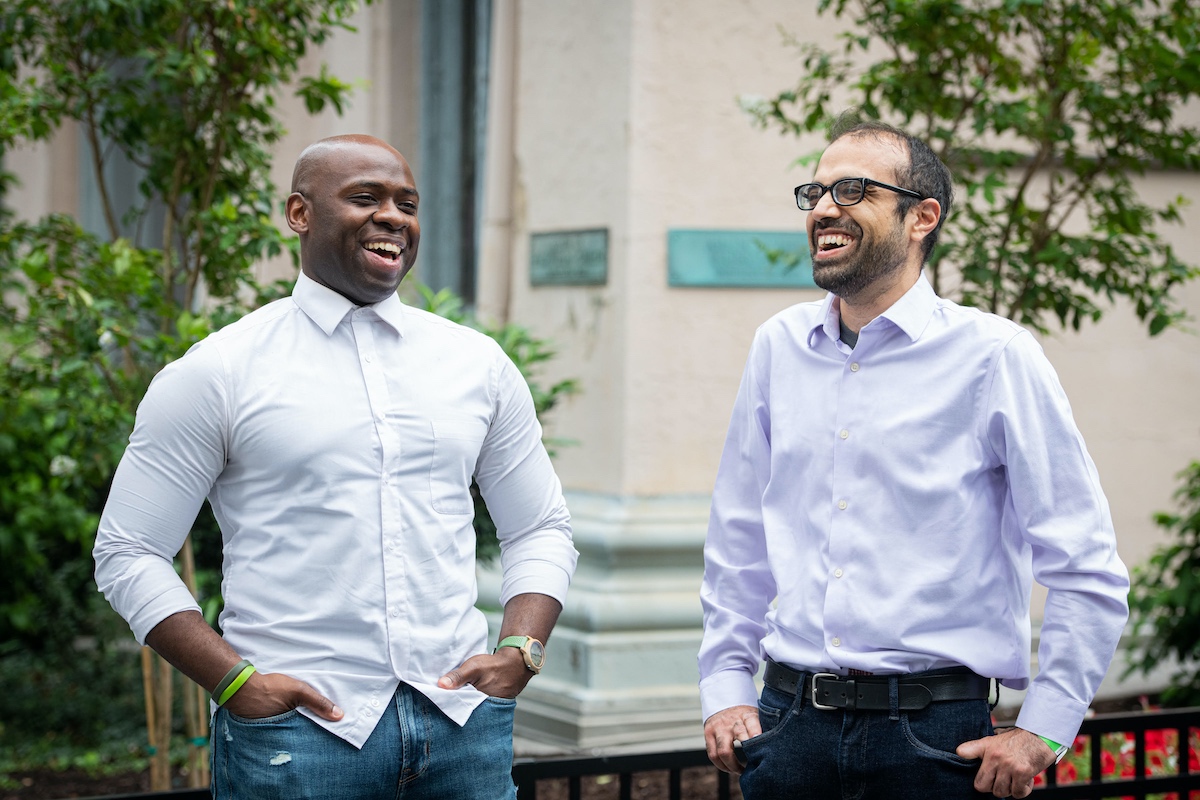
This editorial article is a part of Navigating a (Possible) Recession Month 2023 in Technical.ly’s editorial calendar.
While 2021 was one of the most fruitful years US founders have ever seen (including the best year ever in Philadelphia), 2022 came at a slower, more cautious pace. By Q2 of 2022, it was clear we were in a different market than the year before. The high valuations and raises tech founders had enjoyed in 2021 were coming farther and fewer between. IPOs came to a halt. Layoffs announcements flooded tech industry LinkedIn timelines.
It’s possible or even likely that companies that raised in 2021 will have a “down round” where they raise at a lower valuation than their previous round, said Greg Seltzer, a startup lawyer and partner at Ballard Spahr, in July.
Globally, $681 billion was invested in 2021. About 35% less, or $445 billion, was invested in 2022. The second half of the year showed some stark differences, too, especially when it comes to who got funded.
In Q3 of 2021, $1.1 billion of the quarter’s total $43 billion went to Black-founded companies, TechCrunch found via Crunchbase’s data. But in the same quarter of 2022, that number dropped to $187 million.
The underfunding of Black and brown founders is not news; it’s a well-documented, systemic issue in entrepreneurship and venture capital. While the pandemic has increased the number of new Black business owners, access to capital is limited and resources are sparse. And in an industry where place and networks affect your ability to succeed, Black founders outside of traditional tech hubs like San Francisco might also feel at a disadvantage.
Bruce Marable, cofounder of HR tech company Employee Cycle, represents one of the 32 deals made by Black founders in Q3 of 2022. The company’s $2.5 million seed round from September is roughly 1% of the country’s total raised by Black founders that quarter, as Employee Cycle cofounder Salas Saraiya noted:
Marable is no stranger to the VC game. Employee Cycle is his fourth venture, and its seed round was led by Impellent Ventures with participation from Collab Capital and Converge VC. They also got a mix of some local investors, with Philly’s Tariq Trotter, better known as Black Thought from The Roots, joining in the round as an investor, along with other angel investors and contributors.
The landscape for Black founders has changed a bit over the last few years, Marable said: “There’s two ways to look at it. You can look at general market VCs, who are not specifically looking for Black founders,” he told Technical.ly. “Or you can go after funds that are specifically going after underrepresented founders.”
But the competition in the second category is stiff. “Underrepresented” funds sometimes specifically serve Black founders, but often use the umbrella term to mean non-white, non-male founders. Indigenous, Asian, Latinx and women founders can be considered “underrepresented,” as can LGBTQ+ founders.
“A lot of funds just mean non-white,” Marable said. “Which, on one hand, does remove a lot of people who are raising money. But on the other hand, who’s left is still a lot of people.”
The creation of these funds brings some great things to the table, Marable said. As a non-white founder, you’re likely to experience less bias while pitching these funds, and your product or service is more likely to be understood and valued in a community that experiences the problems you face, if your venture relates to identity. When raising this most recent round, Marable said he and cofounder Saraiya pitched both funds for underrepresented founders and those that didn’t have a focus.
Black founders can go after funds that are specifically meant for underrepresented founders, but competition is stiff, and those funding pools tend to be smaller, Marable said.
Their lead investor, Impellent Ventures, doesn’t have a focus on underrepresented founders. Marable said they got connected to the fund through angel investors in his network, and he and Saraiya ultimately sought Impellent’s network and experience in the HR tech space.
“Because the majority of angel investors did not come from underrepresented backgrounds, their network, in turn, was not very underrepresented,” he said of his investors.
Founding Managing Partner David Brown said its general partners have been investing in the tech space for about 15 years now. The Rochester, New York-based firm founded in 2020 was created not with any focus on identity of founders, but rather diversifying where capital is available. In the early 2000s, Brown said, it was nearly impossible to get funding outside of the “OG tech hubs,” like San Francisco or New York City.
Instead, focusing on investing capital in upstate New York did bring them a diverse set of founders. Brown acknowledged that the VC industry has done “a poor job as a community” in funding Black and brown founders.
The firm added Trotter as a general partner after a New York dinner early last spring, a move Brown said has allowed the firm to be “more explicit within the networks we’ve created.” With the addition of other limited partners and investment programs they’ve worked with in cities outside Rochester, the firm’s network has naturally expanded.
“What’s been uncovered is a lot of diverse founders doing really interesting things,” Brown said. “Not one thing has led to us seeing more deals from Black and brown founders, but it’s grown a significant amount in our portfolio.”
When Marable eventually goes to raise another round, he said he’ll probably follow the same method they did this time around: Pitch as many firms as they’re introduced to, whether they specifically serve Black founders or not. He pointed out one of the flaws in the system, though — most funds for underrepresented founders don’t serve later rounds.
“Most funds are smaller, and as you go up the capital stack, there are less firms in general with that level of capital,” Marable said. “The number of firms decreases.”

Employee Cycle cofounders Bruce Marable (left) and Salas Saraiya. (Courtesy photo)
It’s a situation Tiffanie Stanard is also acutely aware of. She’s the founder of supply chain SaaS solution Stimulus, which also closed a $2.5 million seed round in Q3. The startup’s funding also represents 1% of all VC raised by Black founders that quarter.
Stanard’s round was led by Black founder-focused Black Ops VC with participation from Genius Guild, Morgan Stanley, Northwestern Mutual Future Ventures, REFASHIOND Ventures, Bronze Valley, The BFM Fund, Plain Sight Capital, Penn Medicine — Wharton Fund for Health and angel investors. She’s also gotten investments from locals like Gabriel Investments, Campus Apartments’ David Adelman and Ben Franklin Technology Partners Board Member Osagie Imasogie.
Stanard had the unique experience of raising $1 million in the bang-up year of 2021, and then again about a year and a half later in 2022. Though she saw firsthand the flowing capital of 2021, raising as Black woman founder, especially in the supply chain industry, “is never a great experience,” she said.
“Prior to COVID, it was getting everyday investors to care and understand the industry I was in,” Standard said. “With COVID, there’s so many investors where it’s now part of their thesis, or they have an ESG focus or future-of-work focus. So those conversations got better.”
When signing a deal, the founder is choosing the VC just as much as the VC is choosing the founder, Stanard said.
Stanard’s process for fundraising includes a mixture of warm intros, introductions from friends and investors, and filling out “contact me” pages — “I didn’t wait for people to make an intro if I wanted to speak to that investor.” She also specifically looked for folks who had supply chain as a thesis in their portfolios, or were corporate investors that could turn into customers.
Through both of Stimulus’ rounds, she’s noted red and green flags in investing. When signing a deal, the founder is choosing the VC just as much as the VC is choosing the founder, she said. You shouldn’t have to hound them to sign paperwork. And even though VC spending has plummeted recently, you shouldn’t have to chase an investor, Standard said.
Take a look at your term sheet, she said — it should be founder friendly. A firm that’d been around for years created a side fund for Black founders that offered terms “so sharky” that Stanard’s lawyer was turned off.
“It took my lawyer going through it saying ‘I haven’t seen this in years,’” she said. “There were so many red marks the pages were bleeding.”
Stimulus had just launched its platform at the end of 2020, and Stanard lamented that they weren’t further along when investors were writing checks left and right at the height of the VC boom.
“We had just launched our new product, and we probably missed some of our opportunities,” Standard said. “But from the opposite side, seeing a lot of downrounds right now, the layoffs. As people talk about the recession, it’ll be hard for founders.”
Though she raised $2.5 million in 2022, Standard observed the dip in VC for Black founders from 2021 to 2022, calling it “unsurprising and disappointing.”
But Black and underrepresented founders have always raised with conservative valuations, she said. They’ve never had the luxury of walking into a pitch without being underestimated or working twice as hard to prove their worth. For that reason, Standard said she thinks Black founders will weather this uncertain VC landscape more smoothly than others.
“We’re going to be OK. We’re growing and being strategic about how we valued our company,” Standard said of Stimulus. “We didn’t get to a billion in two months ‘just because.’ We are where we need to be as a company.”
Join the conversation!
Find news, events, jobs and people who share your interests on Technical.ly's open community Slack

Philly daily roundup: Women's health startup wins pitch; $204M for internet access; 'GamingWalls' for sports venues

Philly daily roundup: East Market coworking; Temple's $2.5M engineering donation; WITS spring summit

Philly daily roundup: Jason Bannon leaves Ben Franklin; $26M for narcolepsy treatment; Philly Tech Calendar turns one



